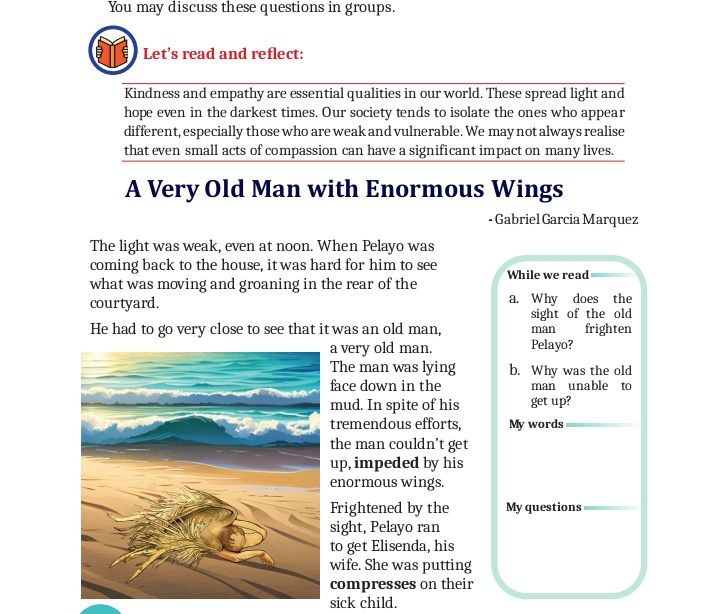Sonnet - 29 - William Shakespeare
SONNET - 29
- William Shakespeare
Sonnet 29 shows the poet at his most insecure and troubled situation. He feels unlucky, shamed, and fiercely jealous of those around him. What causes the poet's anguish will remain a mystery. The speaker presents himself in a despicable state of mind, "an outcaste state". Such a
designation does not suggest a clear autobiographical narrative, it helps in focusing on the mood in which the outcast, lonely speaker seeks solace in remembrance of the love he experienced in the past. In the sonnet we must first note how the speaker of the sonnets is socially situated and that his relation to the addressee has both personal and worldly dimensions. The speaker feels alone and in disgrace, while desiring the “art” and “scope” of other men. In the opening nine lines, he desires worldly success and recognition of self-worth that seem to elude him.
In the first segment of self- exploration, the speaker deploys the emotive of pain almost as a kind of self-fashioning, describing his identity in expressions of scarcity, jealousy, and self-hate: “I. . . beweep my outcast state,” “curse my fate,” “trouble heav’n with . . . my bootless cries,” “myself almost despising.” The source of his suffering seems diffuse and all-encompassing, whereby “sadness” casts its shadow on desired pleasure; but suffering here also implies a religious,
Christian connotation of the “sin of despair,” extending a metaphor between “material and spiritual well-being” From line 10 onwards, the speaker attempts to transform his wide-ranging feelings of
despair by harnessing them to the remembrance of the “sweet love” of his friend.
Haply I think on thee, and then my state,
Like to the lark at break of day arising
From sullen earth, sings hymns at heaven’s gate;
For thy sweet love rememb’red such wealth brings,
That then I scorn to change my state with kings.
Paraphrase
When I’m in disgrace with everyone and my luck has deserted me, I remain all alone and cry about the fact that I’m an outcast, and trouble God with useless cries, which fall on his deaf ears, and I turn to myself and curse my fate, wishing that I had more to hope for, wishing I had this
man’s good looks and that man’s friends, this man’s skillls and that man’s opportunities, and totally dissatisfied with the things I usually enjoy the most. Yet, as I’m thinking these thoughts and almost hating myself, I happen to think about you, and then my condition changes altogether—like a lark at daybreak rising up and leaving the earth far behind to sing hymns to God. Whenever I remember your sweet love, I feel so wealthy that I can’t even think to change my place even with kings.
What is the particular state of mind of the poet in which the poem was written ?
An examination of Shakespeare's life around the time he wrote Sonnet 29 reveals two traumatic events that may have shaped the theme of the sonnet. In 1592 the London theatres closed due to a severe outbreak of plague. Although it is possible that Shakespeare toured the outlying areas of London, it is almost certain that he left the theatre entirely during this time to work on his sonnets.
The closing of the playhouses made it hard for Shakespeare and other actors of the day to earn a living. With plague and poverty looming it is expected that he would feel "in disgrace with fortune”.
Moreover, in 1592 there came a scathing attack on Shakespeare by dramatist Robert Greene, whowarned three of his fellow playwrights that "There is an upstart Crow, beautified with our feathers … supposes he is as well able to bombast out a blanke verse" One can only imagine what grief this assault – this deathbed assault – must have caused Shakespeare.
All is not lost, however, for the sonnet ends with a positive affirmation that the poet can combat his anguish with the "sweet love" of his dear friend.
Sonnet 29: The Facts
Sequence: Sonnet 29 is part of the Fair Youth Sonnets
Key Themes: Self-pity, self-hatred, love overcoming feelings of self-deprecation.
Style: Sonnet 29 is written in iambic pentameter and follows the traditional sonnet form
Rhyme Scheme: ab ab cd cd ef ef gg
Answer the following Questions
1. Shakespeare has written ---number of plays and --- sonnets.
37 plays (More than30) and 154 sonnets
2. What is tragic flaw?
The fundamental tragic traitof the Shakespearean hero, his interest, passion or particular habit of mind that leads to his downfall.
3. Rhyme scheme of Shakespearean sonnet.
abab-cdcd-efef-gg
4. Two major types of sonnets.
Shakespearean or English sonnets and Petrarchan or Italian sonnets.
5. Figure of speech used in the line “Like to the lark at break of day”
Simile
6. Name any four tragedies written by Shakespeare.
King Lear, Macbeth, Hamlet, Othello
Answer the following questions in a paragraph not exceeding 100 words.
1. Evaluate the poem as a sonnet
A sonnet is a poem consisting of 14 lines. Derived from the Italian word "sonnetto", the sonnet traditionally reflects upon a single sentiment, with a clarification or “turn” of thought in its concluding lines. Sonnet 29 is one of 154 sonnets written by William Shakespeare. It shows the poet as vulnerable and dismayed. He feels unlucky, shamed, and
fiercely jealous of those around him but feels better upon thinking of his beloved. The reason for the poet's anguish is still an enigma and there are doubts whether this sonnet is autobiographical. The sorrow quoted here might be more rhetorical than real, being part of the
sonnet tradition, in which many misfortunes contrive to make the lover unhappy. It also serves to highlight the great joy which ends the poem, when he thinks once more on his beloved, as in the psalms, and rises above the clouds.
2. The word “state” occurs thrice in the poem. How does the meaning of this word change with each occurrence?
Shakespeare repeats the word "state’ playing on its ambiguity in meaning i.e "kingdom" and "situation". In the second line “my outcaste state" means the poet is being shunned by the society .In 1592, the poets were jobless due to the closing down of the theatres after the outbreak of plague. Another reason for his outcaste state is his bitter rivalry with Robert
Greene, a fellow playwright. In line 10, it is a little obvious that the "state" is used as pun because it does neatly anticipate the meaning of that final couplet, namely that the Bard’s humble but blessed state of being loved is wealthier than the "state with king" which stands for kingdom or nation.
3. This sonnet was composed in around 1592. If we assume that the speaker is poet himself, find out the possible reasons for the speaker to be out of favour with “Fortune and men’s eye."
In 1592 there was a vehement attack on Shakespeare by dramatist Robert Greene, who, in A Groatsworth of Wit described him as “… an upstart Crow, beautified with our feathers”. One can only imagine what grief this deathbed assault must have caused Shakespeare. Moreover, the poets were jobless as the London theatres were closed due to a severe outbreak of plague. The closing of the playhouses made it hard for Shakespeare and other actors of the day to earn a living. These were probably the reasons for the speaker to be out of favour with "Fortune andmen's eye."
IV. Essay Questions:
1. Comment on the theme of the poem.
Sonnet 29 is one of the sonnets of William Shakespeare’s Fair Youth sequence. It focuses on the speaker's initial state of depression, hopelessness and unhappiness in life and the subsequent recovery through happier thoughts of love. It starts off with self-pity and negative impressions as the poet feels jealousy towards the more advantageous men in the world. He
wants the life that they are living at the beginning of the sonnet. The poet has his own form of possessions, but they are not good enough for him. It becomes evident that the source of the speaker's despondency is that he is not with a friend whom he loves. The bad mood is therefore driven by loneliness.
But then the speaker's mood starts to change. This is brought on by thoughts of the man he loves. As to who Shakespeare was in love with is a moot point. He starts to feel happy and this then moves on to feelings of hope. Shakespeare is able to incorporate a small piece of personification into Sonnet 29 around lines 12-13. "From sullen earth, sings hymns at heaven's gate;" meaning that personification is being applied to heaven by giving it the human quality of sound and allowing it alone to hear the poet's cries of unhappiness with what he
owns now. The conclusion of the speaker is that despite his feelings of loneliness because his friend is not around, just thinking of him makes him feel good again. He even goes as far as to say that he would not change anything in his life: "I scorn to change my state with kings"
because he is richer than those “states”.
Sonnet 29 speaks to all those who have felt that they are worthless or overshadowed by others they deem to be superior but who can overcome dark feelings by thinking of someone they love, who loves them in return.
2. Describe the changes brought over the mind of the speaker by the “sweet memories”.
In Sonnet 29, the poet is full of self-accusation and inner turmoil. He is at the verge of an existential crisis and his self-loathing is even having an effect on Fortune. He feels cursed, destiny has been cruel to him. He spends time alone, delving deep in negative feelings and desiring for "this man's art and that man's scope."
Historically it could have been an uncertain time for William Shakespeare. If this sonnet was written around 1592 then the playwright and poet may well have been feeling a bit down. The plague outbreak had caused all theatres to close down, so he would have been unable to perform his plays. Plus, a certain older rival, Robert Greene, had written an insulting deathbed notice, warning all playwrights to beware of the 'upstart crow' who had taken London and the theatre world by storm.
As negativity seeps into him, the Bard thinks of his beloved, and this alters his state. He is filled with exuberance and, rather than wanting to cry to heaven he now sings hymns at heaven’s gate like the lark at the "break of day". His beloved’s sweet memories bring a ‘wealth’ far greater than anything owned by a king. The former dark and nefarious world wanes away, life is refreshed and made to realise that "love" makes a man "richer" than all the gold that kings can own.



Thanks for sharing such type of informative post. I really like it. It will be very helpful for me. Thanks for sharing such insights. Great work. Much appreciated.
ReplyDeleteTop Christian men’s speakers